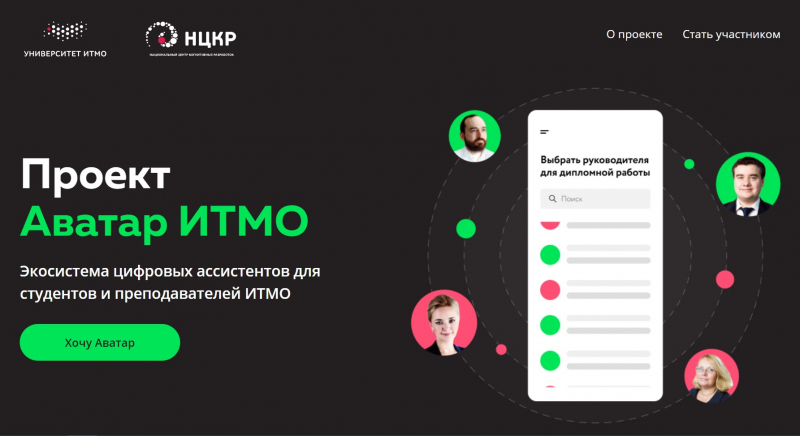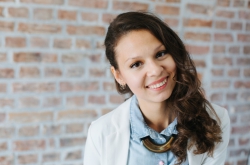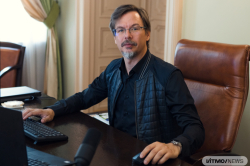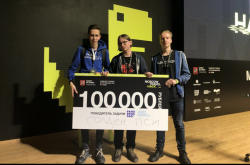The idea
ITMO’s Avatar is a tool that will turn interaction with the university’s ecosystem into a tailor-made experience for every user, be that a student or a lecturer. Potentially, this tool can benefit a wider range of users including prospective students, staff, partners and graduates. This digital avatar platform not only combines a number of useful services but can also perform a number of actions, recommend optimal ways to reach a goal, offer support in making rational and timely decisions, as well as offer personal recommendations based on a person’s search words, behavior and personal achievements. The Avatar learns through regular interactions with its owner – by collecting feedback on its recommendations.
The platform is based on a dynamic data lake that is regularly updated with new data about its participants, which helps to paint their path at ITMO in more detail – the outcome of exam sessions, feedback on lectures and practice classes, attendance of some events and staying away from others that are not as interesting for the user.
After you share your personal values and plans for your development inside the university with your Avatar, you can trace your personal progress, set your goals, find like-minded people and get the best of not only your professional but also your personal development at ITMO.
“Everyone is unique, every ITMO student is unique, so we cannot have a universal path for personal growth. With the help of your Avatar, you can understand what you want to get out of your studies at ITMO more clearly, which will help you to get the closest you can to your goal and bring it into life,” says Daria Kozlova, ITMO University’s First Vice Rector.
Planned realization
In 2020, ITMO’s Avatar will provide the functions of interacting with basic student services for Bachelor’s and Master’s students. The services were chosen by students themselves and represent the things they feel a lack of in real life: personal news, an event guide with interesting conferences, assistance in the choice of their supervisor, as well as information on their academic progress and data on any potential academic backlog.
“The idea behind the platform of avatars is to make a useful, user-friendly and simple tool for every participant of ITMO’s ecosystem that would help them navigate the field of opportunities provided by the university,” explains Klavdiya Bochenina, head of the project, senior research associate and head of the Algorithmics of Complex Systems research group at ITMO’s National Center for Cognitive Technologies. “There are a lot of different activities at our university that you might want to take part in, but there are only 24 hours in a day! It would be great if people approached their opportunities with more awareness.”
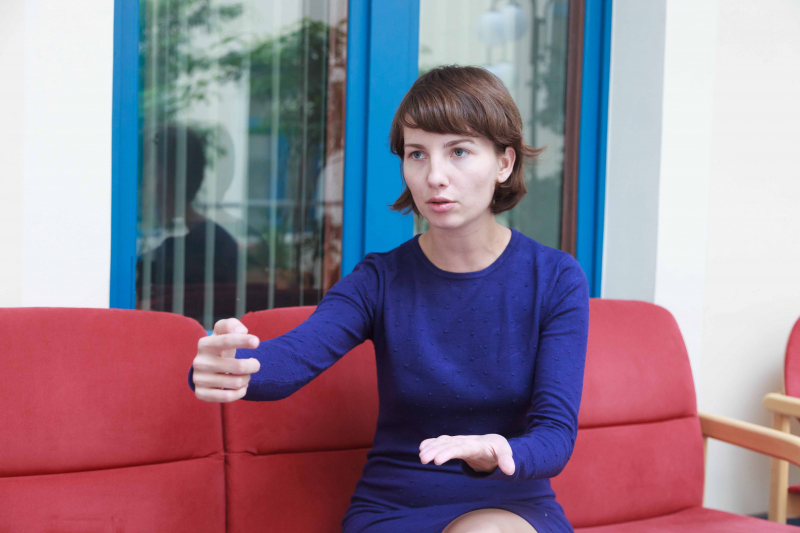
Then the Avatar will get smarter and will be able to build a personal education trajectory, recommending courses, academic mobility destinations, supervisors and co-authors, potential research projects, will register its owner for events, set meetings with other avatars and communicate using the style and qualities of the person it belongs to.
It is planned that the Avatar will be a full-fledged communication and time management tool by 2021.
The combination of all avatars and their services make up the university’s digital ecosystem, or digital university that can dynamically develop both on the inside and on the outside – by interacting with systems in the real world.
“In contrast to the usual virtual assistants and chatbots, the Avatar will regulate the mechanisms it uses to interact with the environment, other avatars and its owner by lowering the owner’s cognitive load. Avatars help users to find balance between their desired self-image and the existing one, between the opportunities provided by ITMO’s ecosystem and the requirements one must comply with there,” notes Klavdiya.
How it works
After users download the app, they need to choose the most important values for them among those provided by ITMO’s ecosystem, and complete a number of surveys to determine their interests, their current and desired competencies and personal qualities. The preferences can be changed later.
“The value mechanism is needed to make the core of the Avatar capable of ranging search results from digital services,” expounds Klavdiya Bochenina. “There are several hundred of those in the university’s ecosystem now, and all of them are competing for the attention of our students and lecturers. The Avatar will help a user create their own view of ITMO’s digital ecosystem, making their personal digital university. But it’s not just an information aggregation tool, it is also a way to transform the university’s business processes.”
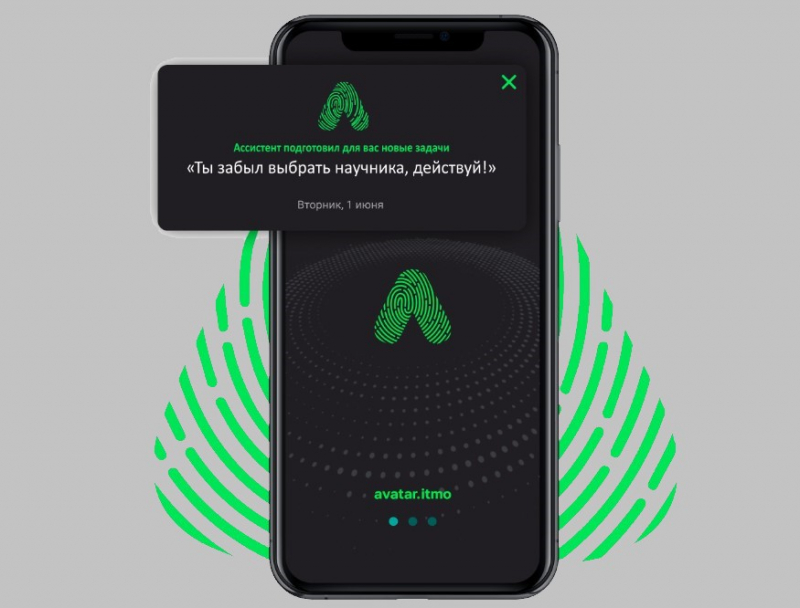
One day of the Avatar can be described by a typical situation when a student needs to choose a thesis supervisor. Let’s imagine that the Avatar gets a notification from ISU (ITMO’s information system) that the deadline for this choice is approaching. Instead of just sending a reminder to the student, it will send a number of surveys to determine their scientific interests. After that, the Avatar will enquire for the list of potential supervisors from the server that recommends them. Moreover, it can even contact the Avatars of those supervisors to get information on their availability. Finally, it can suggest an introductory meeting to discuss the thesis topic. Thus, the service will imitate some of human cognitive abilities in the standardized system of information services.
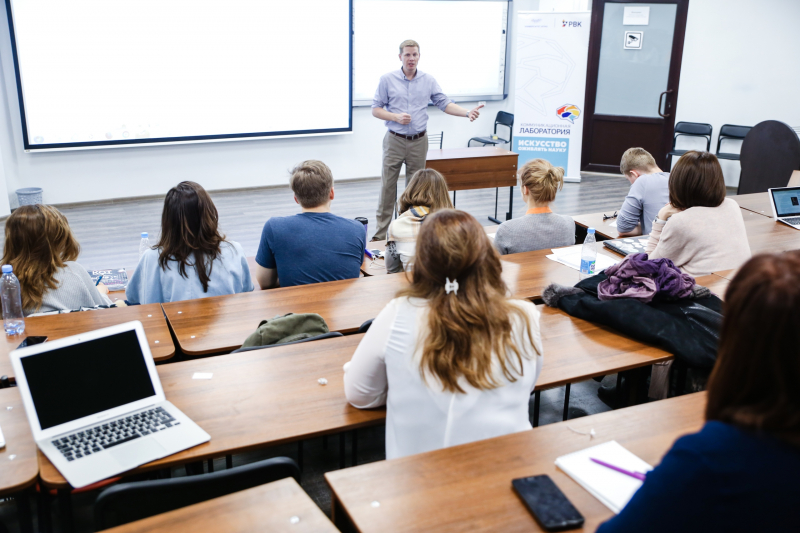
“As the services are forced to compete for a user’s attention, they are constantly evolving. The mechanisms of this competition are provided by the core of the ecosystem, the primary goal of which is to choose the most relevant service in the set time and place, taking into account a user’s values and preferences. As the platform is not a high-level one, it can easily be implemented not only at ITMO but also at any company, or it can even be used at the state, city or household level. These platforms can be integrated together so that digital assistants can help users in any field of life – from routine tasks to paperwork,” comment Danila Vaganov, team lead of the project’s core, and Artem Sementsov, team lead of the project’s backend.
The team behind the project
The team includes several groups of experts from ITMO’s National Center for Cognitive Technologies and other key university faculties. However, as the creators of the project note, the Avatar’s team is technically the entire university because the platform is an open ecosystem with different teams creating their own services to integrate there. Already now, students are developing some of the key apps that will launch at the beginning of the 2020/2021 academic year.
Cooperating and testing
It is planned that the first generation of Avatars will be provided to 700 Bachelor’s and Master’s students who get interested in the service and register for it in September 2020.
The authors of the project note that this will not be a testing stage, but a cooperative work on updating the platform with the most active students potentially getting a position on the project’s team.
You can submit your application to become one of the first users at avatar.itmo.ru (in Russian). The main requirements are to be a Bachelor’s or Master’s student at ITMO and leave a valid email that you will be sent an invitation link to in September. Those who will only enter ITMO in September will also get the chance to register for the system (there will be 200 places available) so that they can start interacting with ITMO’s ecosystem and set their professional goals from the very beginning.
Those willing to join the project’s team now can contact Klavdiya Bochenina, the head of the project, at kbochenina@itmo.ru with their suggestions.
All information about the project will be available on the website by the end of summer, so that everyone interested can learn about the registration, the plans, the opportunities, etc.
